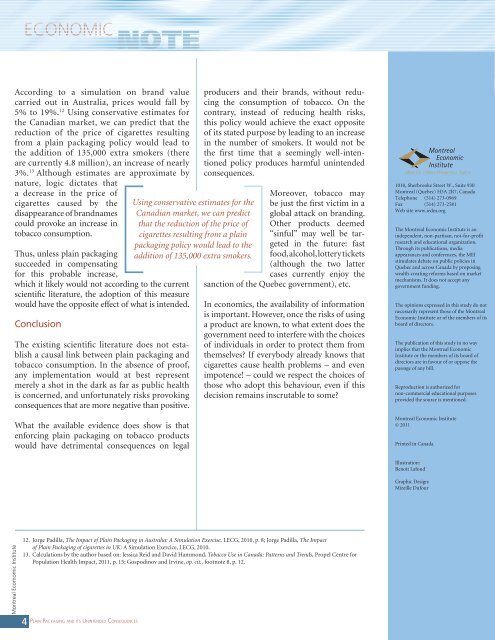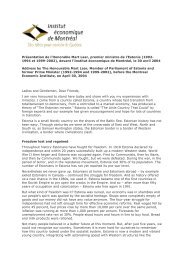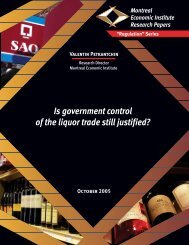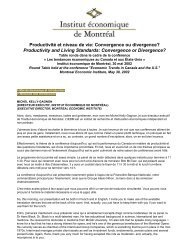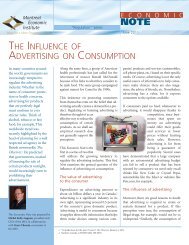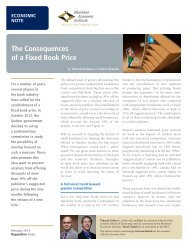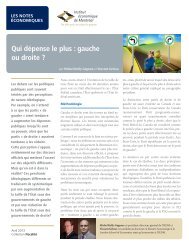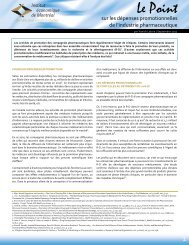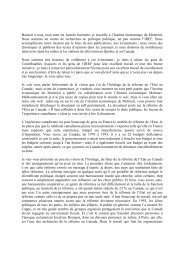Plain Packaging and its Unintended Consequences - IEDM
Plain Packaging and its Unintended Consequences - IEDM
Plain Packaging and its Unintended Consequences - IEDM
You also want an ePaper? Increase the reach of your titles
YUMPU automatically turns print PDFs into web optimized ePapers that Google loves.
Montreal Ecomomic Institute<br />
ECONOMIC NOTE<br />
According to a simulation on br<strong>and</strong> value<br />
carried out in Australia, prices would fall by<br />
5% to 19%. 12 Using conservative estimates for<br />
the Canadian market, we can predict that the<br />
reduction of the price of cigarettes resulting<br />
from a plain packaging policy would lead to<br />
the addition of 135,000 extra smokers (there<br />
are currently 4.8 million), an increase of nearly<br />
3%. 13 Although estimates are approximate by<br />
nature, logic dictates that<br />
a decrease in the price of<br />
cigarettes caused by the<br />
disappearance of br<strong>and</strong>names<br />
could provoke an increase in<br />
tobacco consumption.<br />
Thus, unless plain packaging<br />
succeeded in compensating<br />
for this probable increase,<br />
which it likely would not according to the current<br />
scientific literature, the adoption of this measure<br />
would have the opposite effect of what is intended.<br />
Conclusion<br />
The existing scientific literature does not establish<br />
a causal link between plain packaging <strong>and</strong><br />
tobacco consumption. In the absence of proof,<br />
any implementation would at best represent<br />
merely a shot in the dark as far as public health<br />
is concerned, <strong>and</strong> unfortunately risks provoking<br />
consequences that are more negative than positive.<br />
What the available evidence does show is that<br />
enforcing plain packaging on tobacco products<br />
would have detrimental consequences on legal<br />
12. Jorge Padilla, The Impact of <strong>Plain</strong> <strong>Packaging</strong> in Australia: A Simulation Exercise, LECG, 2010, p. 8; Jorge Padilla, The Impact<br />
of <strong>Plain</strong> <strong>Packaging</strong> of cigarettes in UK: A Simulation Exercice, LECG, 2010.<br />
13. Calculations by the author based on: Jessica Reid <strong>and</strong> David Hammond, Tobacco Use in Canada: Patterns <strong>and</strong> Trends, Propel Centre for<br />
Population Health Impact, 2011, p. 15; Gospodinov <strong>and</strong> Irvine, op. cit., footnote 8, p. 12.<br />
4<br />
<strong>Plain</strong> <strong>Packaging</strong> <strong>and</strong> <strong>its</strong> <strong>Unintended</strong> conseqUences<br />
Using conservative estimates for the<br />
Canadian market, we can predict<br />
that the reduction of the price of<br />
cigarettes resulting from a plain<br />
packaging policy would lead to the<br />
addition of 135,000 extra smokers.<br />
producers <strong>and</strong> their br<strong>and</strong>s, without reducing<br />
the consumption of tobacco. On the<br />
contrary, instead of reducing health risks,<br />
this policy would achieve the exact opposite<br />
of <strong>its</strong> stated purpose by leading to an increase<br />
in the number of smokers. It would not be<br />
the first time that a seemingly wellintentioned<br />
policy produces harmful unintended<br />
consequences.<br />
Moreover, tobacco may<br />
be just the first victim in a<br />
global attack on br<strong>and</strong>ing.<br />
Other products deemed<br />
“sinful” may well be targeted<br />
in the future: fast<br />
food,alcohol,lotterytickets<br />
(although the two latter<br />
cases currently enjoy the<br />
sanction of the Quebec government), etc.<br />
In economics, the availability of information<br />
is important. However, once the risks of using<br />
a product are known, to what extent does the<br />
government need to interfere with the choices<br />
of individuals in order to protect them from<br />
themselves? If everybody already knows that<br />
cigarettes cause health problems – <strong>and</strong> even<br />
impotence! – could we respect the choices of<br />
those who adopt this behaviour, even if this<br />
decision remains inscrutable to some?<br />
1010, Sherbrooke Street W., Suite 930<br />
Montreal (Quebec) H3A 2R7, Canada<br />
Telephone (514) 273-0969<br />
Fax (514) 273-2581<br />
Web site www.iedm.org<br />
The Montreal Economic Institute is an<br />
independent, non-partisan, not-for-profit<br />
research <strong>and</strong> educational organization.<br />
Through <strong>its</strong> publications, media<br />
appearances <strong>and</strong> conferences, the MEI<br />
stimulates debate on public policies in<br />
Quebec <strong>and</strong> across Canada by proposing<br />
wealth-creating reforms based on market<br />
mechanisms. It does not accept any<br />
government funding.<br />
The opinions expressed in this study do not<br />
necessarily represent those of the Montreal<br />
Economic Institute or of the members of <strong>its</strong><br />
board of directors.<br />
The publication of this study in no way<br />
implies that the Montreal Economic<br />
Institute or the members of <strong>its</strong> board of<br />
directors are in favour of or oppose the<br />
passage of any bill.<br />
Reproduction is authorized for<br />
non-commercial educational purposes<br />
provided the source is mentioned.<br />
Montreal Economic Institute<br />
© 2011<br />
Printed in Canada<br />
Illustration:<br />
Benoit Lafond<br />
Graphic Design:<br />
Mireille Dufour


